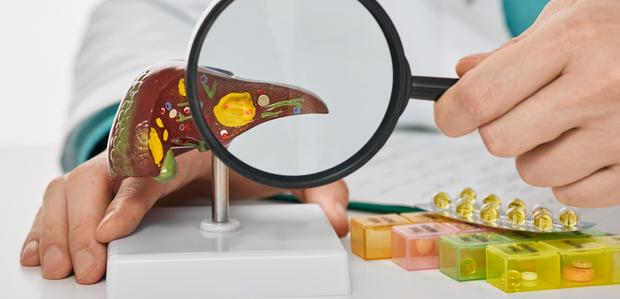Department of Hepatology

Hepatology is the medical speciality that deals with the Liver, Gallbladder, Biliary tree, and Pancreas, as well as the treatment of conditions affecting these Organs. Hepatologists are medical professionals who exclusively focus on this field, even though it has historically been considered a subspecialty of Gastroenterology. Patients with any type of Liver condition can receive innovative treatment from the Section of Hepatology.
Hepatology at Gleneagles Hospital, Lakdi-Ka-Pul, Hyderabad
The Department of Hepatology at Gleneagles Hospital, Lakdi-Ka-Pul, Hyderabad, has been established with the aim of becoming a centre of excellence in the field of Hepatology and Liver Transplantation. This facility is fully equipped to address the entire spectrum of Liver problems, from asymptomatic anomalies in liver tests to complex cases of advanced liver disorders. Our highly qualified and experienced specialists are dedicated to providing expert clinical treatment to individuals suffering from Hepatology Liver Diseases.
Symptoms of Hepatic Conditions
Usually, there aren't obvious symptoms or indicators of Liver disease. If symptoms do appear, they may include:
- Eyes and skin that seem yellowish
- Swelling and pain in the abdomen
- Itchy skin
- Dark urine colour
- White stool colour
- Nausea or vomiting
- Loss of appetite
- An easy-to-bruise tendency
Diagnostic tests
We offer a comprehensive range of diagnostic tests to aid in the assessment, diagnosis, and understanding of suspected diseases:
- CT Scan: A computerised tomography (CT) scan creates detailed images of the body using X-ray technology.
- MRI Scan: An MRI scan is a medical imaging method that produces body images using radio waves and magnetic fields.
- Cholescintigraphy Scans: Cholescintigraphy scans use small amounts of radioactive material to help capture images of the biliary tract.
- Liver Biopsy: A Liver biopsy is a surgical procedure that involves the removal of a small portion of Liver tissue for evaluation.
- Blood Tests: Blood tests are employed to diagnose infections, such as gallstones and pancreatitis, as well as inflammation of the hepatic organs.
Endoscopy: Endoscopies are procedures that utilise long tubes with cameras to provide images of your hepatic system, allowing for a closer examination of the gallbladder and bile ducts
Our Doctors
View all
Dr Chandan Kumar K N
SENIOR CONSULTANT HEPATOLOGIST & LEAD T
MD (General Medicine), DM (Hepatology)
Hepatology at Gleneagles Hospital, Lakdi-Ka-Pul, Hyderabad
The Department of Hepatology at Gleneagles Hospital, Lakdi-Ka-Pul, Hyderabad, has been established with the aim of becoming a centre of excellence in the field of Hepatology and Liver Transplantation. This facility is fully equipped to address the entire spectrum of Liver problems, from asymptomatic anomalies in Liver tests to complex cases of advanced Liver disorders. Our highly qualified and experienced specialists are dedicated to providing expert clinical treatment to individuals suffering from Hepatology Liver diseases.
Hepatology Procedure at Gleneagles Hospital, Lakdi-Ka-Pul, Hyderabad
- Advanced Interventional Hepatobiliary Radiology - This advanced interventional radiology method is used for diagnosing and treating hepatobiliary diseases.
- Liver Transplantation - A team of specialist doctors performs partial or full Liver Transplants during surgery.
- Complex Resection Surgery - We offer complex resection procedures for pancreatic, biliary tract, and Liver tumours.
- Minimally Invasive & Robotic HPB Surgery - We use minimally invasive and robotic techniques to treat malignant and benign conditions of the Liver , pancreas, and biliary tree.
- Liver Biopsy Procedure - In certain cases, a Liver biopsy is necessary to determine the exact cause of Liver damage, which helps in tailoring the course of treatment. This procedure can be carried out laparoscopically, transjugular (via the vein), or percutaneously, and the choice depends on the patient's specific needs.
Why choose Gleneagles Hospital, Lakdi-Ka-Pul, Hyderabad?
Gleneagles Hospital, one of the best Hepatology hospitals in Hyderabad, has integrated surgery suites and state-of-the-art critical care units that deLiver excellent patient care in a relaxing setting. The best Hepatology doctors in Hyderabad in the Department of Hepatology are highly qualified and trained in chronic Liver disease treatment. The highly skilled team of Hepatology doctors and surgeons performs the treatments and surgeries with great dedication, yielding remarkable outcomes.
- Where in Hyderabad can I get excellent care for Liver, Pancreatic and gallbladder disorders?
One of the best Hepatology hospitals in Hyderabad, Gleneagles Hospitals, Lakdi-Ka-Pul treats severe cases of hepatic, biliary, and pancreatic disorders with a high percentage of success.
- Which kind of Liver illness are managed at Gleneagles Hospital, Lakdi-Ka-Pul?
At Gleneagles Hospitals, Lakdi-Ka-Pul, we specialise in treating a range of conditions connected to the Liver , including Cirrhosis, Cancer, fatty Liver, Hepatitis, and more.
- What is Hepatology?
A medical speciality called Hepatology focuses on understanding, diagnosing, treating, and preventing conditions connected to the Liver.
- Who has the highest risk of the Liver conditions?
Despite the fact that anybody can develop the disease, males are often more likely than women to develop Liver Cancer. In contrast, young women are more frequently affected by other Liver diseases, such as Autoimmune Hepatitis.
FAQ
Why Choose Us
-
PATIENT EXPERIENCE
Your care and comfort are our top priorities. We ensure that the patients are well informed prior to every step we take for their benefit and that their queries are effectively answered.
-
LATEST TECHNOLOGY
The Gleneagles Hospitals' team stays up to date on the advancements in medical procedures and technologies. Experience the Future Healthcare Technologies now at Gleneagles Hospitals.
-
PROVIDING QUALITY CARE
Strengthening lives through compassionate care, innovative therapies and relentless efforts. It reflects in the DNA of our passionate team of doctors and dedicated clinical staff.










